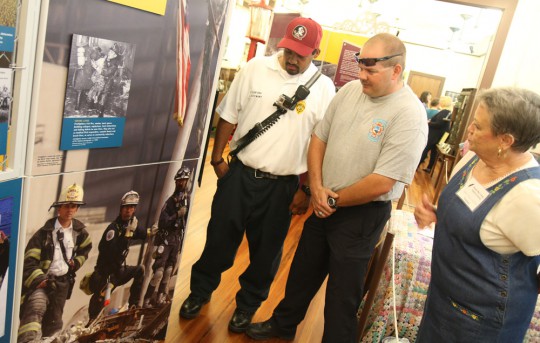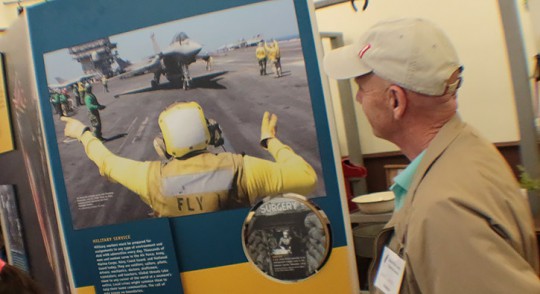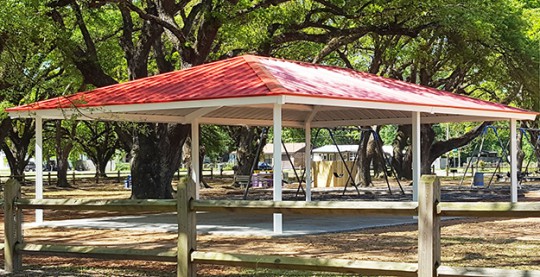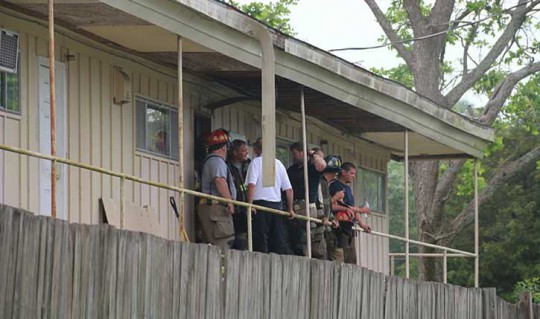Supreme Court To Hear Nine Mile Popeye’s Murder Case
April 30, 2016
The Florida Supreme Court will hear arguments Thursday in a high-profile case that forced an overhaul of the state’s death-penalty sentencing system.
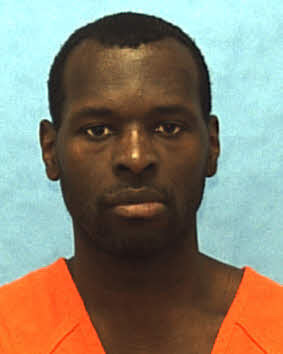 The case involves Timothy Lee Hurst, who was sentenced to death for the 1998 killing of fast-food worker Cynthia Harrison in Pensacola. Harrison, an assistant manager at a Nine Mile Road Popeye’s Fried Chicken restaurant where Hurst worked, was bound, gagged and stabbed more than 60 times. Her body was found in a freezer.
The case involves Timothy Lee Hurst, who was sentenced to death for the 1998 killing of fast-food worker Cynthia Harrison in Pensacola. Harrison, an assistant manager at a Nine Mile Road Popeye’s Fried Chicken restaurant where Hurst worked, was bound, gagged and stabbed more than 60 times. Her body was found in a freezer.
Hurst was the plaintiff in a legal challenge that led to the U.S. Supreme Court finding in January that Florida’s death-penalty sentencing system was unconstitutional because it gave too much power to judges, instead of juries. State lawmakers and Gov. Rick Scott quickly approved changes to the system to try to resolve the constitutional issues.
The arguments Thursday are expected to focus on Hurst’s contention that the Florida Supreme Court should order that he receive a life sentence, instead of facing execution.
In briefs, Hurst’s attorneys have raised a series of arguments related to the U.S. Supreme Court ruling, including that Hurst received the death sentence under what was an unconstitutional process.
“The constitutional defect in Hurst’s death sentence is that the judge, rather than a jury, determined ‘each fact necessary to impose a sentence of death,’ ” said part of a brief filed last month, quoting the U.S. Supreme Court. But Attorney General Pam Bondi’s office has argued in court papers that the Florida Supreme Court should reject Hurst’s request for a life sentence, in part contending that any error in his death sentence was “harmless.”
Today’s Your Last Chance To See Free Smithsonian Exhibit In Molino
April 30, 2016
Today is your last chance to see “The Way We Worked,” a Smithsonian Traveling Exhibition for free in Molino.
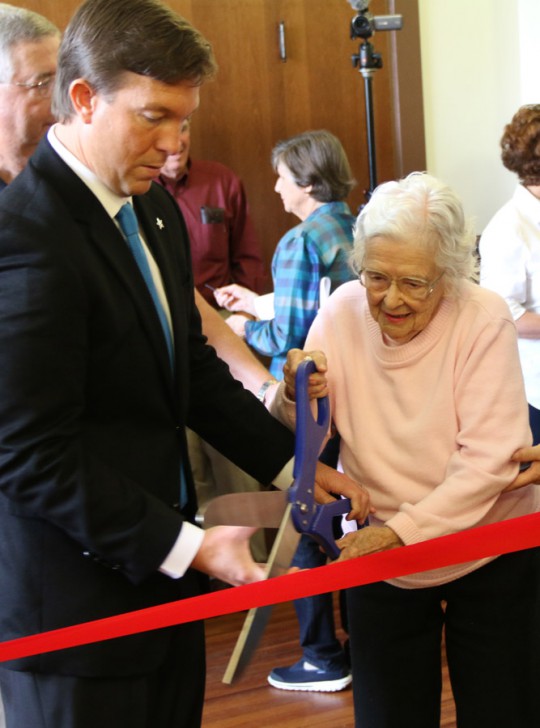 The exhibition, which celebrates the history of American workers, will be open Saturday from 10 am. until 4 p.m. at the Lillian F. King Museum located in the Molino Community Complex, 6450 Highway 95A North. The exhibit has been open since late March.
The exhibition, which celebrates the history of American workers, will be open Saturday from 10 am. until 4 p.m. at the Lillian F. King Museum located in the Molino Community Complex, 6450 Highway 95A North. The exhibit has been open since late March.
For more photos from opening day, click here.
“The Way We Worked” was made possible in Molino by the Florida Humanities Council. “The Way We Worked”, an exhibition created by the National Archives, is part of Museum on Main Street, a collaboration between the Smithsonian Institution and State Humanities Councils nationwide. Support for Museum on Main Street has been provided by the United States Congress.
Pictured: Scenes from the March 19 opening day of “The Way We Worked exhibit in Molino. NorthEscambia.com photos, click to enlarge.
Florida Gov’t Weekly Roundup: In Conclusion
April 30, 2016
Several things seemed to be winding down in Florida government this week.
At the Capitol, two of the highest-ranking Republicans in the state finally managed to resolve their differences over a hiring decision. Neither man walked away with a complete victory, but that didn’t mean that it didn’t further the idea that one of the participants — Gov. Rick Scott — was losing a little bit of his pull.
 Meanwhile, the Florida Supreme Court and an administrative law judge handed down a couple of high-profile rulings, one with a potentially wide-ranging impact on the state’s businesses and another touching on a particularly hot-button social issue.
Meanwhile, the Florida Supreme Court and an administrative law judge handed down a couple of high-profile rulings, one with a potentially wide-ranging impact on the state’s businesses and another touching on a particularly hot-button social issue.
There were signs that some of the fights that have shaped politics in 2016 would rage on; Democratic Congresswoman Corrine Brown notified a federal court that she would appeal its ruling in a contentious redistricting case to the U.S. Supreme Court. But resolution seemed to be the name of the game, even if it was just to clear the decks for the inevitable battles that lie ahead.
PEACE IN OUR TIMES
The “lame duck” whispers around Scott had already ticked up to a dull roar by the time the Legislature was done giving him few pieces of his legislative agenda during the session that ended in March. Now, it seems that Scott can’t even corral Republican members of the Cabinet to go along with him.
The governor spent the week locked in a continuing showdown with Chief Financial Officer Jeff Atwater over the state’s next insurance commissioner. And while Atwater didn’t get his first choice for the position, neither did Scott.
The difficulty arose because of a difference between the two men, who have to jointly recommend the head of the Office of Insurance Regulation to Atwater’s two colleagues on the Cabinet: Attorney General Pam Bondi and Agriculture Commissioner Adam Putnam.
For their parts, Bondi and Putnam tried to stay away from the contretemps.
“Just like on criminal matters, I seem to feel you listen to me,” Bondi said Tuesday. “I would hope that when you two gentlemen come to an agreement — unless I believe someone is woefully inadequate, which I hope I won’t, based on the two of you and your great experience in this field — but hopefully I’ll be able to back your candidate. But I think the two of you need to come to an agreement first.”
Scott backed Jeffrey Bragg, a Palm Harbor resident and former executive director of a U.S. Department of the Treasury terrorism-risk insurance program. After an awkward silence in which his motion Tuesday to hire Bragg for $150,000 a year didn’t get a second, the governor suggested holding a meeting Friday.
Meanwhile, Scott and Atwater also disagreed about how long current Insurance Commissioner Kevin McCarty could stay on the job. McCarty was originally scheduled to step down May 2, but announced as the split between Scott and Atwater persisted that he would be willing to remain another 45 days.
Scott’s office said McCarty couldn’t do that without a specific vote by the Cabinet. In a memo, Scott lawyer William Spicola said the governor and the Cabinet accepted McCarty’s resignation during a January Cabinet meeting.
“McCarty cannot unilaterally extend his appointment after he, the governor and the Cabinet all mutually agreed that his last day would be on May 2nd,” Spicola wrote.
Atwater issued a statement Wednesday disagreeing.
“I am disappointed that in its eagerness to replace Commissioner McCarty, the governor’s office has chosen to quibble about his resignation letter,” Atwater said in a release. “We should take full advantage of Commissioner McCarty’s gracious offer to continue to provide consistent and knowledgeable leadership during this period, thereby affording the Cabinet the opportunity for a thorough and well considered hiring process.”
But things were resolved by essentially listening to advice from Vanessa Williams: Sometimes the very thing you’re looking for is the one thing you can’t see. Scott and Atwater finally agreed during a special meeting Friday to promote from within, tapping Deputy Commissioner David Altmaier for the job.
As commissioner, Altmaier, who a decade ago was working as a high-school math teacher and track coach in Kentucky, will see his salary increase from $115,000 a year to $165,000 a year.
Scott and Atwater also agreed that McCarty will remain with the state for 60 days beyond his planned departure date to assist in the transition — keeping him around as the hurricane season begins June 1.
“The dynamics of this office are so broad,” Atwater said after Altmaier was chosen. “If something were to come early, (Altmaier) has another set of eyes and ears (in McCarty) that he can be turning to for guidance. But mainly it was for the broad, broad range of responsibilities that he’s now taking on that he can have somebody nearby.”
Altmaier, who since March 2015 has overseen the agency’s Bureau of Property and Casualty Financial Oversight and Product Review, said he is aware of the “magnitude of the position” and he had no problem with two additional months working with McCarty.
“I have learned an incredible amount from Commissioner McCarty during my tenure working with him, and I would welcome 60 more days of learning from him as we transition,” Altmaier said.
Altmaier, who received a degree in mathematics from Western Kentucky University, briefly worked as a high school teacher before going to work for a private insurance agency in 2006. He joined the Office of Insurance Regulation in 2008, where he’s served in a number of positions, including as a reinsurance and financial specialist and as chief analyst.
A BLOW FOR BUSINESS
While Scott and Atwater were tussling over the state’s insurance commissioner, the Florida Supreme Court was dealing with another area of state insurance law — one limiting attorney’s fees in workers-compensation cases.
In a 5-2 ruling, the court struck down the fee law, a victory for attorneys who represent injured workers — and a blow to business groups that have long argued legal fees drive up the costs of workers-compensation insurance. The fee issue will bounce back to the Legislature, where it could spark a fierce debate.
Justice Barbara Pariente, writing for the court’s majority, said the 2009 law is a violation of due-process rights under the Florida Constitution and the U.S. Constitution because it prevents challenges to the “reasonableness” of attorney’s fees awarded in workers-compensation cases. The ruling stemmed from a case in which an attorney was awarded the equivalent of $1.53 an hour in successfully pursuing a claim for benefits for a worker injured in Miami.
Pariente wrote that the goal of the workers-compensation system is to quickly provide benefits to get injured people back on the job at a reasonable cost to employers.
“This case, and many others like it, demonstrate that despite the stated goal, oftentimes the worker experiences delay and resistance either by the employer or the (insurance) carrier,” wrote Pariente, who was joined in the majority by Chief Justice Jorge Labarga and justices R. Fred Lewis, Peggy Quince and James E.C. Perry. “Without the likelihood of an adequate attorney’s fee award, there is little disincentive for a carrier to deny benefits or to raise multiple defenses, as was done here.”
But Justice Charles Canady wrote a dissent that said the law involves a “policy determination” by the Legislature that there should be a relationship between the amount of benefits obtained in workers-compensation cases and the amount of attorney’s fees awarded. The law includes a formula that links benefits and attorney’s fees.
“In reaching the conclusion that the statute violates due process, the majority fails to directly address the actual policy of the statute,” wrote Canady, who was joined in dissent by Justice Ricky Polston. “Instead, the majority assumes — without any reasoned explanation — that due process requires a particular definition of ‘reasonableness’ in the award of statutory attorney’s fees. The definition assumed by the majority categorically precludes the legislative policy requiring a reasonable relationship between the amount of a fee award and the amount of the recovery obtained by the efforts of the attorney. Certainly, this legislative policy may be subject to criticism. But there is no basis in our precedents or federal law for declaring it unconstitutional.”
Business groups weren’t shy about blasting the ruling. Florida Chamber of Commerce President and CEO Mark Wilson said in a prepared statement the “potential impact of the high court’s ruling could threaten Florida’s improving business climate. The Florida Chamber remains laser focused on ensuring workers’ comp rates are fair, and we will lead the effort before lawmakers and in the halls of justice to ensure the voices of job creators are heard.”
‘NO TESTIMONY OR DOCUMENTARY EVIDENCE’
In a less-sweeping but nevertheless politically charged case, meanwhile, an administrative law judge Thursday rejected a state agency’s arguments that a Gainesville abortion clinic should be fined for performing second-trimester abortions without a proper license.
In a 25-page ruling, Judge Lawrence P. Stevenson concluded that the Florida Agency for Health Care Administration had failed to make its case against Bread & Roses Well Woman Care.
AHCA filed an administrative complaint against Bread and Roses in August, contending that the clinic, which is licensed to perform only first-trimester abortions, had performed five abortions on women who were in the second trimesters of pregnancies.
“AHCA presented no testimony or documentary evidence refuting the credible evidence presented by Bread & Roses that the sonograms show on their face that the pregnancies for each of the five procedures at issue were first trimester pregnancies and within the scope of Bread & Roses’ license,” Stevenson wrote.
The fines would have cost the clinic $500 for each of the five procedures, or $2,500.
Stevenson’s ruling Thursday is a recommended order, which, under administrative law, goes to the agency. The judge recommended that the agency dismiss the complaint against Bread & Roses.
Bread & Roses has also figured in another recent abortion dispute. Last year, the clinic joined a lawsuit challenging the constitutionality of a state law requiring 24-hour waiting periods before women can have abortions. Last week, the Florida Supreme Court temporarily blocked the law and granted a stay of a lower court’s order allowing the law to take effect.
That allows women to get abortions without a waiting period for the time being, until the constitutional challenge finds its way through the courts.
The battle over abortion clinics, it seems, isn’t truly over just yet.
STORY OF THE WEEK: Gov. Rick Scott and Chief Financial Officer Jeff Atwater agree to recommend Deputy Insurance Commissioner David Altmaier to take over the Office of Insurance Regulation, settling a weeks-long feud.
QUOTE OF THE WEEK: “Under the original Constitution, African-Americans were considered to be three-fifths of a human being. We’ve moved beyond that point, (but) now our first African-American president only gets seven-eighths of a term.”—Democratic Congressman Alan Grayson, in a debate with Republican Congressman David Jolly, a fellow candidate for the U.S. Senate. The Senate’s GOP majority has refused to hold a hearing on Merrick Garland, President Barack Obama’s nominee, because of the upcoming November elections.
by Brandon Larrabee, The News Service of Florida
Century Man Charged With Stealing $22.7K From Jailed Man’s Account
April 29, 2016
A Century man has been charged in connection with the withdrawal of over $20,000 from a Century man’s bank account while he was in jail.
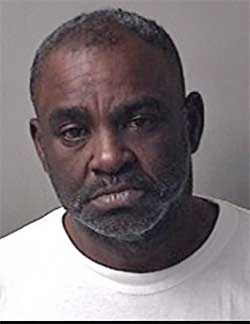 Cary Johnson, 52, is charged with grand theft and felony fraud. He remained in the Escambia County Jail Friday morning with bond set at $30,000.
Cary Johnson, 52, is charged with grand theft and felony fraud. He remained in the Escambia County Jail Friday morning with bond set at $30,000.
Investigators said Johnson was along for the ride as 27-year old Lolita Shantel Thomas went multiple times to a local credit union and withdrew a total of $22,700 without the account holder’s permission..
The victim, according to arrest report, is former jail bunkmate of Thomas’ boyfriend. Thomas was given permission to retrieve the victim’s vehicle from the county impound lot following his arrest, but she was not given permission to withdraw funds. Thomas was caught on credit union surveillance video with Johnson cashing checks at a drive-thru window.
Thomas was arrested about a month ago on similar charges and is awaiting trial.
The withdrawals were made over a period of two months in 2015.
New Pavilion Installed At Carver Park In Cantonment
April 29, 2016
Escambia County Parks and Recreation has installed a new covered pavilion at Carver Park in Cantonment. The two acre neighborhood park also has a playground, basketball courts, security lights, benches and picnic area. The park also has a small community building and some of the most historic oak trees in Escambia County. NorthEscambia.com photos, click to enlarge.
Rep. Jeff Miller Endorses Trump For President
April 29, 2016
Thursday, House Veterans Affairs’ Committee Chairman Jeff Miller (FL-01) endorsed Donald Trump for president.
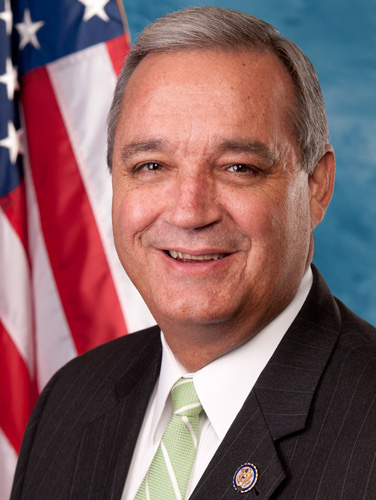 Miller has represented Florida’s 1st Congressional District since 2001. Prior to being elected to represent the people of Northwest Florida in Washington, he served in the Florida State House. Since 2011, Miller has served as chairman of the House Committee on Veterans’ Affairs, and in 2014, he negotiated a sweeping VA reform law that included his proposal to provide accountability by empowering the VA secretary to fire poorly performing managers.
Miller has represented Florida’s 1st Congressional District since 2001. Prior to being elected to represent the people of Northwest Florida in Washington, he served in the Florida State House. Since 2011, Miller has served as chairman of the House Committee on Veterans’ Affairs, and in 2014, he negotiated a sweeping VA reform law that included his proposal to provide accountability by empowering the VA secretary to fire poorly performing managers.
“Donald Trump is the only person who has what it takes to shake up the status quo and entrenched bureaucrats in Washington D.C.,” Miller said. “I am more and more convinced that he has the ability to reach in and right the wrongs in the Department of Veterans Affairs once and for all.
“America needs Donald Trump and his conservative agenda to shore up and secure our borders and to rebuild our military,” added Miller. “I stand today with Donald Trump, and l support his candidacy for President.”
“Miller is the kind of results-oriented person we need more of in Congress,” said Trump. “He has uncovered scandals within the VA and the poor treatment of our veterans, and I applaud those efforts. But our veterans deserve better than an agency that has failed them, and I look forward to working with Jeff to make sure every veteran gets the kind of care they have earned and the kind of care they deserve.”
Couple Arrested For Multi-State Crime Spree
April 29, 2016
A man and woman who were on a multi-state crime spree have been taken into custody after racking up charges locally and in several other states.
The pair were arrested in Montgomery County, TX, said Detective Shannan Briarton. They were wanted locally for purse snatching incidents that occurred last week at businesses in Pensacola and Santa Rosa County. They were taken into custody in Texas after a deputy found them sleeping in a car that had been stolen in Santa Rosa County.
The suspects – Timmie Sawyer, 25, of Oklahoma City, OK and Justin Turner 25, of Edmond, OK– have each been charged by the Pensacola Police Department with grand theft, fraudulently using credit cards more than two times, and robbery.
The first incident occurred around 2 p.m. April 16 when the suspects drove up to a woman in the parking lot of Walmart, 2650 Creighton Road. Sawyer tried to steal the woman’s purse but the woman, who was in her 20s, struggled with Sawyer and the couple left without the purse. The victim was not hurt.
The second incident occurred around 11 p.m. April 18 when Sawyer entered the Walmart in Pace, stole a 75-year-old woman’s purse out of a shopping cart and left the store, but not before Sawyer pushed a 64-year-old woman who tried to stop her from leaving. The woman fell but wasn’t injured.
Turner was waiting outside the Pace Walmart in a car that had been stolen from Oklahoma. The pair left the area, but returned a short time later and stole the 75-year-old woman’s car, which they located by using the key fob.
Briarton said the suspects have been linked to similar crimes in Niceville, Destin and Escambia County in addition to Mississippi, Texas and Oklahoma. The Santa Rosa County Sheriff’s Office is also in the process of filing charges. The investigation is continuing and they may be tied to additional crimes elsewhere.
Anyone having information on the suspects is asked to contact Detective Shannan Briarton at (850) 435-1978, by email at sbriarton@cityofpensacola.com or the Pensacola Police Department at (850) 435-1900.
Florida Legal Bills Mount In Gambling Dispute
April 29, 2016
Florida has paid more than $260,000 to private law firms in gambling lawsuits involving the Seminole Tribe of Florida, with the likelihood of hundreds of thousands of dollars more on the horizon.
The Seminoles and the state are fighting over the tribe’s “exclusive” right to operate banked card games, including blackjack, at five of the tribe’s seven casinos. The $260,000 tab for taxpayers started building shortly before two dueling lawsuits were filed by the Seminoles and the state in October and does not include legal bills that likely will pile up before the consolidated cases go to trial.
The state Department of Business and Professional Regulation has hired two law firms to work with agency attorneys on the case, overseen in Tallahassee by U.S. District Judge Robert L. Hinkle. A trial, originally slated for this summer, was recently postponed until October, at the request of both sides.
The agency, which oversees gambling, in August hired Detroit-based Dickinson Wright, a law firm with offices throughout the country, including in Nevada and Washington, D.C., to represent the state “in the mediation required” between the Seminoles and Florida regarding a 2010 agreement, called a “compact,” at the heart of the dispute.
The state has agreed to pay three of the firm’s lawyers — Robert Stocker, Dennis Whittlesey and Jonathan Secrest — $350 an hour, as well as paying hourly rates of between $195 and $275 for three other lawyers. State regulators originally agreed to pay the firm $45,000 for legal work, but the contract, amended several times, now totals $250,000. As of this week, the agency had paid Dickinson Wright $217,876.61, according to documents provided to The News Service of Florida.
In December, gambling regulators hired Bush Ross, a law firm based in Tampa, to also advise the agency on the compact. The agency initially agreed to pay the firm $50,000, but the amended contract is now worth $100,000. Under the contract, the state agreed to pay lawyers J. Carter Andersen and Anne-Leigh Gaylord Moe $300 an hour, other lawyers $200 an hour, and an hourly rate of $100 for work done by paralegals. Thus far, the state has paid $43,118.83 to the firm.
According to court documents, much of the legal wrangling in the case has involved where the dispute would be heard. The two sides still have to go through a time-consuming information “discovery” process, and the Seminoles have just started taking depositions. Motions for summary judgment have not yet been filed, meaning the state is likely on the hook for a much bigger legal tab in the months to come, especially if the case goes to trial in October, as scheduled.
Since 2010, the Seminoles have had exclusive rights to offer the banked card games. In exchange, the tribe promised to pay the state a minimum of $1 billion over five years, an amount which it has exceeded. But the agreement regarding the cards — part of a larger, 20-year deal — expired on July 31. The terms of the compact gave the Seminoles a 90-day “grace period” after the agreement expired to continue operating the banked card games.
But, after mediation — brokered by a lawyer whose past clients included Mick Jagger and Leona Helmsley — failed, the tribe filed a lawsuit against the state, alleging that Florida officials had failed to negotiate in “good faith” on a new deal.
The lawsuit also alleges that the state breached the compact by allowing pari-mutuel facilities to offer what are known as “player-banked” card games in which “the bank” is another player instead of “the house.” The tribe contends that allowing such games violated its rights to exclusivity in operating banked card games, which typically involve players betting against the house instead of each other.
Less than a week after the tribe filed its lawsuit, the state filed a separate suit in Tampa seeking to stop the banked card games at Seminole casinos.
The Indian Gaming Regulatory Act requires states to negotiate in good faith with tribes seeking gambling authority. Florida argued that the federal law only requires states to negotiate initial compacts but not to renegotiate deals when they expire.
“The contention is plainly wrong,” Hinkle wrote in January, rejecting Attorney General Pam Bondi’s request that the tribe’s lawsuit be dismissed. At the time, Hinkle also consolidated the tribe’s lawsuit and the state’s lawsuit in federal court in Tallahassee.
Gov. Rick Scott and tribal leader James Billie in December signed a proposed 20-year compact in which the tribe pledged to pay the state $3 billion over seven years in exchange for being able to add craps and roulette to its casino operations. Lawmakers failed to approve the proposed deal, however, during the legislative session that ended in March.
by Dara Kam, The News Service of Florida
Fire Damages Atmore Apartment
April 29, 2016
Fire damaged an apartment in the 100 block of 6th Avenue in Atmore Thursday afternoon. There was no word of any injuries or the cause of the fire. The Atmore and Poarch Fire Departments responded. NorthEscambia.com photos, click to enlarge.
Barons Beat The Wahoos
April 29, 2016
The Birmingham Barons won the opening game of its five-game series, 4-0, with Pensacola by limiting the Blue Wahoos lineup to three hits in the game at Regions Field.
 Barons pitcher Tyler Danish, who’s in his second year in Double-A with the White Sox organization, gave up a hit in the second inning to Blue Wahoos left fielder Tony Renda and in the third inning to second baseman Alex Blandino, who ended up stranded at third base.
Barons pitcher Tyler Danish, who’s in his second year in Double-A with the White Sox organization, gave up a hit in the second inning to Blue Wahoos left fielder Tony Renda and in the third inning to second baseman Alex Blandino, who ended up stranded at third base.
In the ninth inning, Renda hit a two-out triple off of Danish and was 2-4 on the night improving his batting average to .275.
Danish, the No. 11 prospect, pitched a complete game, giving up just three hits, walking two and striking out six. He improved to 2-2 on the season with a 3.56 earned-run average.
Pensacola pitcher Sal Romano gave up all four Baron runs in six innings, walked two and struck out seven.
Romano fell to 0-1 and his ERA increased to 4.09. He gave up a two-out home run to Birmingham’s Richmond in the second inning and a homer to first baseman Nicky Delmonico in the fourth inning.
After hitting .289 against the Jackson Generals in its home stand, Pensacola went 3-29 against the Baron’s Danish. The Blue Wahoos left 11 runners on base for the game.
The Barons added two more runs in the seventh inning to go up, 4-0. Delmonico scored on a single by DH Josh Richmond. Next, Birmingham third baseman Trey Michalczewski crossed the plate on a catcher Josh Dowdy single to right field.


